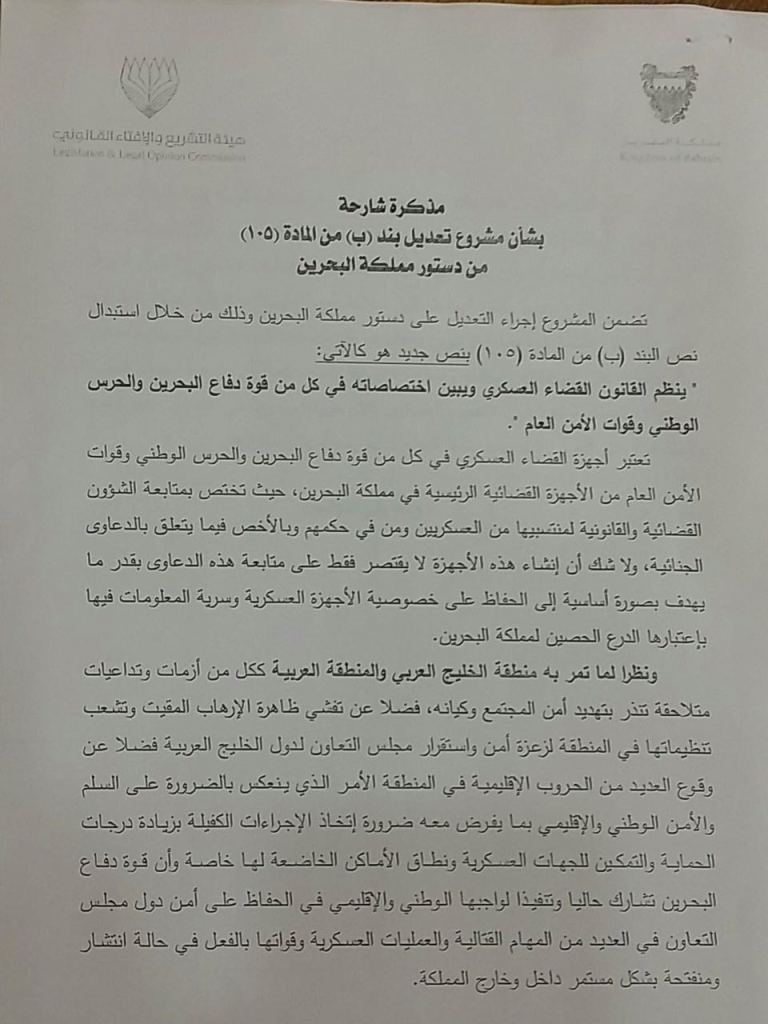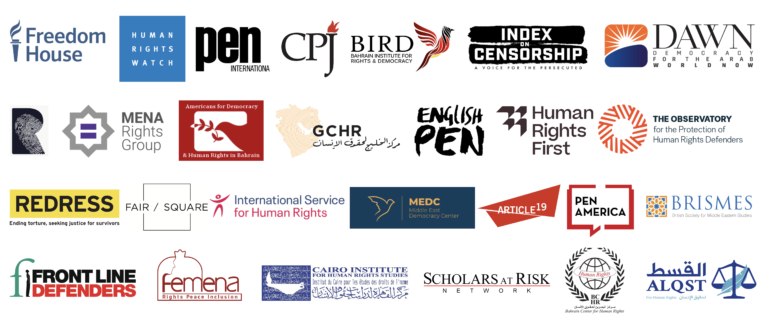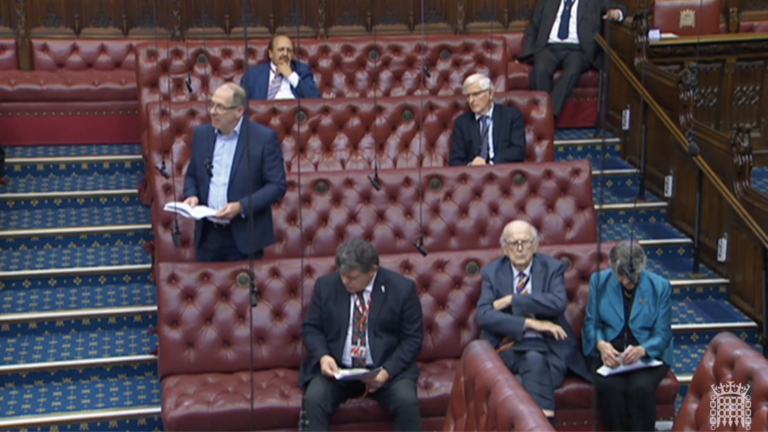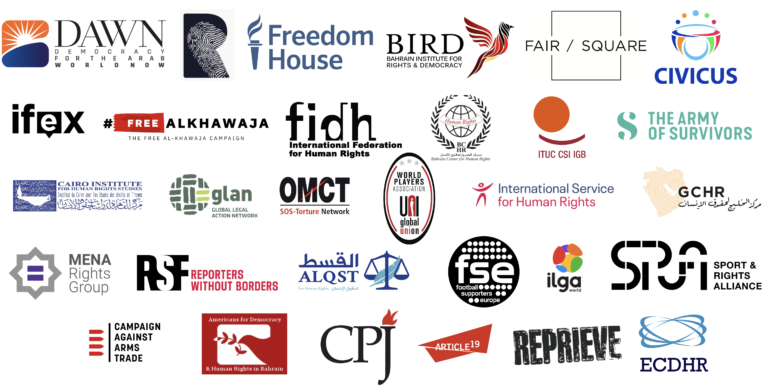6 February 2017 – Military courts may soon have permanent power to prosecute civilians as the Government of Bahrain fast-tracks a constitutional amendment which creates a state of “undeclared martial law.” We, the undersigned, call on Bahrain’s legislature not to approve the amendment, and condemn any attempt to try civilians by military judges.
On 2 February, the King of Bahrain began the process of amending article 105(b) of the constitution, a process which is expected to take only a month. The article governs the role of military courts, and the amendment removes all legal limitations on military courts, opening the possibility of the court being used against civilians. A Bahraini legal expert told BIRD and ADHRB that “it is a new martial law” and expressed fears that civilians will be prosecuted there and denied fair trials and access to lawyers.
In 2011, military courts were granted powers to try civilians when martial law was declared in March that year, as part of the government’s widespread repression of pro-democracy protesters. The National Safety Courts prosecuted at least 300 protesters, according to the Bahrain Independent Commission of Inquiry (BICI, para 1289). Among those tried in the National Safety Courts were doctors, nurses and the Bahrain 13, a group of political leaders and human rights defenders sentenced between five years and life imprisonment. The BICI found that “fundamental principles of a fair trial, including prompt and full access to legal counsel and inadmissibility of coerced testimony, were not respected” in the National Safety Courts (para. 1720).
Impunity is systemic in both the military and civilian justice systems. Mansour Al-Mansour, the military judge who sat on the National Safety Courts, is today a senior member of the Joint Incidents Assessment Team, a Saudi Coalition team charged with investigating international humanitarian law violations in Yemen. BIRD considers Mansour Al-Mansour’s team to be whitewashing war crimes in Yemen. Since the National Safety Courts were closed, civilian criminal courts have persistently failed to provide basic fair trial guarantees. Three torture victims executed in January 2017 were convicted in civilian criminal courts under the anti-terrorism law; the civilian court judges dismissed consistent torture allegations and denied them proper legal council.
The amendment is the latest legislation in 2017 to create human rights risks. In January, the Government of Bahrain reinstated law enforcement powers to the National Security Agency, directly reversing their disempowerment in 2011 following the BICI recommendations. One of the NSA’s first arrests since reinstatement of powers was recorded on 1 February. Protesters were tortured under NSA custody in 2011, and one detainee, businessman Kareem Al-Fakhrawi, was killed in their custody in April 2011.
Husain Abdulla, Executive Director, Americans for Democracy & Human Rights in Bahrain: “Bahrain has been an undeclared police state for many years now, but if this amendment goes through and civilians are tried by military courts, then we will have a situation far more sinister than what we witnessed in 2011. This time, the processes of unfair trial will be embedded in the country’s constitution itself.”
Sayed Ahmed Alwadaei, Director of Advocacy, Bahrain Institute for Rights and Democracy: “Bahrain is creating a state of undeclared martial law. If the king approves this amendment, he will officially take Bahrain to a state worse than 2011, and will have declared himself as the most repressive leader on record in the country. This amendment is set to destroy any pretence of rule of law.”
Article 105(b) and Its Amendment
The Constitution, which was promulgated in 2002, states the following under article 105(b):
“The jurisdiction of military courts shall be confined to military offences committed by members of the Defence Force, the National Guard, and the Security Forces. It does not extend to other persons except when martial law is declared and within the bounds prescribed by law.”
Article 105(b) explicitly limits the jurisdiction of military courts to military offences committed by members of the armed and security forces, and excludes all civilians, except during martial law.
The text of the proposed amendment states:
The law regulates the military judiciary and shows its competencies with regards to Bahrain Defense Force, the National Guard and the Public Security Forces.
The amended article removes all limitations on the military courts, and states only that the law regulates the military judiciary. The amendment was put forward in an explanatory note circulated through Bahrain’s government on 2 February.
The note states: “It is essential for the military judicial system within the Constitution of Bahrain to be updated in order to achieve the goals and objectives referred to by replacing the text of clause (b) of article 105 with a new paragraph that extends the mandate of the military justice system to include crimes that are defined by the law, in order to achieve and maintain the integrity, prestige and interests of all security forces in the kingdom, and especially the Bahrain Defence Forces, entrusted with defending and protecting the country and securing its independence, sovereignty, and security, considering also that the nature of offenses committed against the security apparatus make the military justice system flexible and speedy in investigating and sentencing.”
The full text of the explanatory note has been translated and can be read here. The implication that the military justice system will be used to “maintain the integrity, prestige and interests” of security forces strongly suggests that future military courts could be used against civilians, particularly those charged under the anti-terrorism law.
As the vaguely-worded amendment removes the limitations of military courts and the explanatory note states that the “integrity, prestige and interests” of the security forces must be “maintained”, the amendment appears set to prosecute offences which are deemed to harm the security forces.
The effect of this could be wide-ranging. Many persons on death row and at imminent risk of execution, including Ali Al-Singace, Abbas Al-Samea and Sami Mushaima, who were executed in January 2017, are convicted of killing police officers in unfair trials which rely on confessions extracted under torture. Activists have even been prosecuted for “insulting” the armed forces, such as human rights defender Nabeel Rajab, who was sentenced to 6 months in prison for criticising the military and security forces in 2015, and who currently faces a litany of free expression charges, including “insulting a statutory body”, in relation to his exposure of torture in Bahrain’s prisons. The vaguely worded amendments may allow future critics and torture victims to be unfairly tried by military courts.
After the circulation of the explanatory note on 2 February, Bahrain’s National Assembly met on 5 February in a special session which gave responsibility of writing the new amendment to the assembly’s legislative committee. The committee is to publish a report on the new amendment within 15 days. The National Assembly will consider this report within 15 days of its publication, the amendment must be approved by a two-thirds majority of both the National Assembly and Shura Council; the amendment is then forwarded to the King for final approval.
The fast-track process for constitutional amendments means that the martial courts new powers are set to be turned into law by the end of March 2017.
International Human Rights Law
The trial of civilians by military courts will violate the right to a fair trial, as protected under Article 14 of the International Covenant on Civil and Political Rights (ICCPR), which Bahrain acceded to in 2006.
The Human Rights Committee, the UN body which monitors States compliance with the rights enshrined in the ICCPR, has noted that “the trial of civilians in military or special courts may raise serious problems as far as the equitable, impartial and independent administration of justice is concerned. Therefore, it is important to take all necessary measures to ensure that such trials take place under conditions which genuinely afford the full guarantees stipulated in article 14.”
Violations of the right to fair trial occurred systematically in the National Safety Courts in 2011, and have continued systematically since then in the civilian criminal courts.
We, the undersigned, condemn any attempt to unfairly subject civilians to military courts which violate their rights to a fair trial. We urge that the proposed amendment to article 105(b) of the 2002 Constitution is rejected by the Government of Bahrain, and that all courts in the country be brought in line with international standards to respect the right to a fair trial as enshrined under article 14 of the ICCPR.
Signed,
Americans for Democracy & Human Rights in Bahrain
Bahrain Institute for Rights and Democracy
European Centre for Democracy and Human Rights





